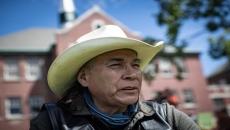Canada's chief public health officer says there is an urgent need for more people between 18 and 39 to get vaccinated against COVID-19 to reduce the impact of the Delta variant.
1/2 63% of people aged 18-29 and 68% of people aged 30-39 are now #FullyVaccinated with #COVID19Vaccines. https://t.co/8Uw8R9t5Sz pic.twitter.com/TuzHyF9Qy9
— Dr. Theresa Tam (@CPHO_Canada) September 3, 2021
"This is a crucial moment," Dr. Theresa Tam said Friday at her first in-person COVID-19 briefing since Aug. 12.
"We have a window of opportunity to rapidly accelerate vaccine uptake and close the protection gap in younger age groups."
The number of cases in Canada each day grew from about 700 in early August, to almost 3,500 now. The vast majority of cases are among unvaccinated individuals, with Tam saying unvaccinated people are 12 times more likely to be infected and 36 times more likely to be hospitalized if they get infected.
New modelling released by Tam Friday showed if the current rate of transmission of COVID-19 remains the same, Canada could see more than 15,000 new cases a day by the beginning of October.
That would be almost twice the 8,500 daily cases Canada was seeing on average at the height of the third wave, though so far hospitalizations are not rising as quickly as they did in the spring.
"But of course, we can do something about a resurgence," Tam said.
It doesn't have to mean lockdowns, she said, which nobody wants. More vaccinations, particularly among younger adults, and provincial governments using targeted measures such as public mask mandates and capacity limits, should do it.
"This seems like we said the same thing last fall but we now have vaccines as a critical tool," said Tam.
More than three-quarters of Canadians over the age of 12 are now fully vaccinated. Tam said to keep the more infectious Delta variant from overwhelming our health care systems that number needs to climb above 80 per cent, particularly in younger age groups with the lowest vaccine uptake and the highest infectious rates.
Health Canada data show there are 7.9 million Canadians at least 12 years old who aren't yet fully vaccinated and half of them are between 18 and 39.
Tam said raising vaccine uptake in that age group is the most critical because young people tend to have more close contacts. They also account for the most infections. National data shows 44 per cent of new COVID-19 cases in July and August were in people between 20 and 39 years old, while they make up 27 per cent of the total population.
Another 1.6 million Canadians between 18 and 39 need to get fully vaccinated to hit 80 per cent. Another 216,000 people in their 40s, and 318,690 kids between 12 and 17 need to get vaccinated for those groups to hit 80 per cent. Everyone over 50 has already hit that target.
Tam said she'd love that to happen by Labour Day, but since that's extremely unlikely, she said it should happen as soon as possible after that.
"The moment you get people back indoors, to access all those important essential things that we need to do, we will see accelerations," she said. "So we've got not very much time."
Tam said there will be federal advice coming soon on the use of booster shots among immunocompromised adults, and people in long-term care, who didn't get the same boost from two doses as most people with a healthy immune system.
"I would just ask caution and patience for a booster for the rest of the population, because we haven't seen enough data," said Tam. "And based on the information we have at hand in Canada, we're not seeing a lot of breakthrough infections and infections aside, vaccines are really extraordinarily effective, even against hospitalizations by the Delta variant."
Tam said getting the first two doses to people not vaccinated at all will make more of a difference to curbing this fourth wave than widely distributing booster shots to those who are already fully vaccinated.
"Without bridging that (vaccine) gap in the younger adult population, I don't expect a significant impact on that wave," Tam said.






